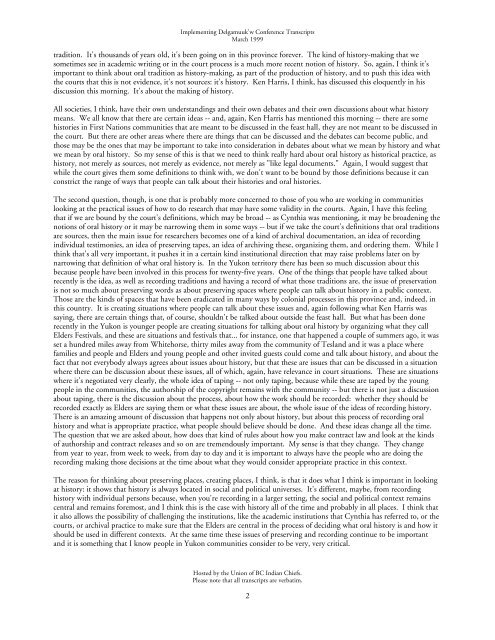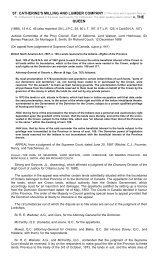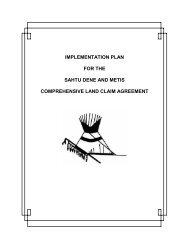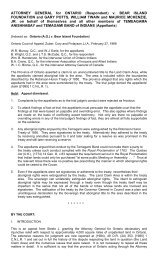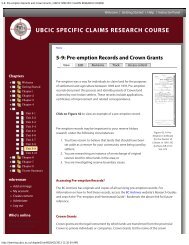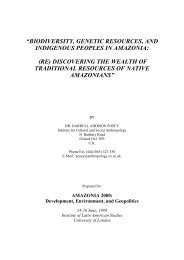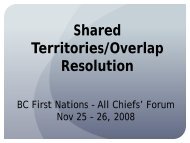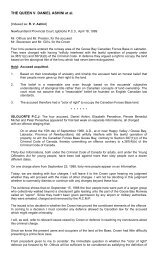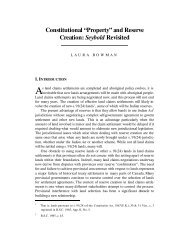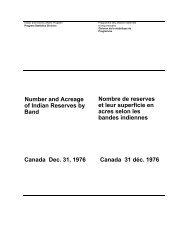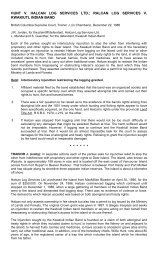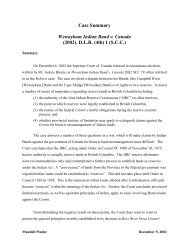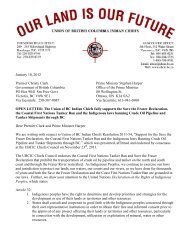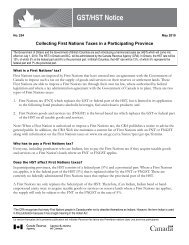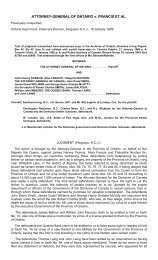Julie Cruikshank - Union of British Columbia Indian Chiefs
Julie Cruikshank - Union of British Columbia Indian Chiefs
Julie Cruikshank - Union of British Columbia Indian Chiefs
Create successful ePaper yourself
Turn your PDF publications into a flip-book with our unique Google optimized e-Paper software.
Implementing Delgamuuk’w Conference Transcripts<br />
March 1999<br />
tradition. It's thousands <strong>of</strong> years old, it's been going on in this province forever. The kind <strong>of</strong> history-making that we<br />
sometimes see in academic writing or in the court process is a much more recent notion <strong>of</strong> history. So, again, I think it's<br />
important to think about oral tradition as history-making, as part <strong>of</strong> the production <strong>of</strong> history, and to push this idea with<br />
the courts that this is not evidence, it's not sources: it's history. Ken Harris, I think, has discussed this eloquently in his<br />
discussion this morning. It's about the making <strong>of</strong> history.<br />
All societies, I think, have their own understandings and their own debates and their own discussions about what history<br />
means. We all know that there are certain ideas -- and, again, Ken Harris has mentioned this morning -- there are some<br />
histories in First Nations communities that are meant to be discussed in the feast hall, they are not meant to be discussed in<br />
the court. But there are other areas where there are things that can be discussed and the debates can become public, and<br />
those may be the ones that may be important to take into consideration in debates about what we mean by history and what<br />
we mean by oral history. So my sense <strong>of</strong> this is that we need to think really hard about oral history as historical practice, as<br />
history, not merely as sources, not merely as evidence, not merely as "like legal documents." Again, I would suggest that<br />
while the court gives them some definitions to think with, we don't want to be bound by those definitions because it can<br />
constrict the range <strong>of</strong> ways that people can talk about their histories and oral histories.<br />
The second question, though, is one that is probably more concerned to those <strong>of</strong> you who are working in communities<br />
looking at the practical issues <strong>of</strong> how to do research that may have some validity in the courts. Again, I have this feeling<br />
that if we are bound by the court's definitions, which may be broad -- as Cynthia was mentioning, it may be broadening the<br />
notions <strong>of</strong> oral history or it may be narrowing them in some ways -- but if we take the court's definitions that oral traditions<br />
are sources, then the main issue for researchers becomes one <strong>of</strong> a kind <strong>of</strong> archival documentation, an idea <strong>of</strong> recording<br />
individual testimonies, an idea <strong>of</strong> preserving tapes, an idea <strong>of</strong> archiving these, organizing them, and ordering them. While I<br />
think that's all very important, it pushes it in a certain kind institutional direction that may raise problems later on by<br />
narrowing that definition <strong>of</strong> what oral history is. In the Yukon territory there has been so much discussion about this<br />
because people have been involved in this process for twenty-five years. One <strong>of</strong> the things that people have talked about<br />
recently is the idea, as well as recording traditions and having a record <strong>of</strong> what those traditions are, the issue <strong>of</strong> preservation<br />
is not so much about preserving words as about preserving spaces where people can talk about history in a public context.<br />
Those are the kinds <strong>of</strong> spaces that have been eradicated in many ways by colonial processes in this province and, indeed, in<br />
this country. It is creating situations where people can talk about these issues and, again following what Ken Harris was<br />
saying, there are certain things that, <strong>of</strong> course, shouldn't be talked about outside the feast hall. But what has been done<br />
recently in the Yukon is younger people are creating situations for talking about oral history by organizing what they call<br />
Elders Festivals, and these are situations and festivals that... for instance, one that happened a couple <strong>of</strong> summers ago, it was<br />
set a hundred miles away from Whitehorse, thirty miles away from the community <strong>of</strong> Tesland and it was a place where<br />
families and people and Elders and young people and other invited guests could come and talk about history, and about the<br />
fact that not everybody always agrees about issues about history, but that these are issues that can be discussed in a situation<br />
where there can be discussion about these issues, all <strong>of</strong> which, again, have relevance in court situations. These are situations<br />
where it's negotiated very clearly, the whole idea <strong>of</strong> taping -- not only taping, because while these are taped by the young<br />
people in the communities, the authorship <strong>of</strong> the copyright remains with the community -- but there is not just a discussion<br />
about taping, there is the discussion about the process, about how the work should be recorded: whether they should be<br />
recorded exactly as Elders are saying them or what these issues are about, the whole issue <strong>of</strong> the ideas <strong>of</strong> recording history.<br />
There is an amazing amount <strong>of</strong> discussion that happens not only about history, but about this process <strong>of</strong> recording oral<br />
history and what is appropriate practice, what people should believe should be done. And these ideas change all the time.<br />
The question that we are asked about, how does that kind <strong>of</strong> rules about how you make contract law and look at the kinds<br />
<strong>of</strong> authorship and contract releases and so on are tremendously important. My sense is that they change. They change<br />
from year to year, from week to week, from day to day and it is important to always have the people who are doing the<br />
recording making those decisions at the time about what they would consider appropriate practice in this context.<br />
The reason for thinking about preserving places, creating places, I think, is that it does what I think is important in looking<br />
at history: it shows that history is always located in social and political universes. It's different, maybe, from recording<br />
history with individual persons because, when you're recording in a larger setting, the social and political context remains<br />
central and remains foremost, and I think this is the case with history all <strong>of</strong> the time and probably in all places. I think that<br />
it also allows the possibility <strong>of</strong> challenging the institutions, like the academic institutions that Cynthia has referred to, or the<br />
courts, or archival practice to make sure that the Elders are central in the process <strong>of</strong> deciding what oral history is and how it<br />
should be used in different contexts. At the same time these issues <strong>of</strong> preserving and recording continue to be important<br />
and it is something that I know people in Yukon communities consider to be very, very critical.<br />
Hosted by the <strong>Union</strong> <strong>of</strong> BC <strong>Indian</strong> <strong>Chiefs</strong>.<br />
Please note that all transcripts are verbatim.<br />
2


